THE SIZZLE’S A FIZZLE
It is an uncontestable fact that every play August Wilson wrote justifies being looked at again and again. It has been fascinating to see how the moral, political and emotional life of African-Americans has been given the sweep of history by concentrating on the ten decades of a tumultuous century and how far-reaching their truths seem, despite the fact that most of them take place in a relatively small area, the Hill District of Pittsburgh, that would seem to limit rather than expand the horizons of such a bold undertaking, but which, in fact, do just the opposite.
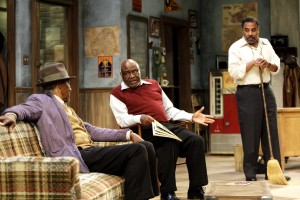 An event of epic proportions would be to do all ten plays in the cycle in a single season, created by passionate and committed artists who may indeed be forever indebted to the legacy these plays have given them, in much the same way that the Druid Theatre Company of Galway, under the inspired direction of Garry Hynes, has dedicated whole seasons to the works of John Millington Synge and Tom Murphy. I look forward to it happening in my lifetime and not just because of the social and artistic significance of such an event but because Wilson’s language soars, because he has taken the cadences of African-American speech and transformed them into poetry, in much the same way that Clifford Odets took the rhythms of Jewish immigrants and found in them a peculiarly American vernacular or the way Sean O’Casey took the common speech of the Irish and created from it an elevated ripeness of heartfelt rage and sorrow that has practically become the Anglicized Gaelic we all think of today as Irish.
An event of epic proportions would be to do all ten plays in the cycle in a single season, created by passionate and committed artists who may indeed be forever indebted to the legacy these plays have given them, in much the same way that the Druid Theatre Company of Galway, under the inspired direction of Garry Hynes, has dedicated whole seasons to the works of John Millington Synge and Tom Murphy. I look forward to it happening in my lifetime and not just because of the social and artistic significance of such an event but because Wilson’s language soars, because he has taken the cadences of African-American speech and transformed them into poetry, in much the same way that Clifford Odets took the rhythms of Jewish immigrants and found in them a peculiarly American vernacular or the way Sean O’Casey took the common speech of the Irish and created from it an elevated ripeness of heartfelt rage and sorrow that has practically become the Anglicized Gaelic we all think of today as Irish.
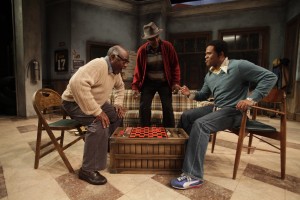 Jitney was probably not intended to be a part of such an ambitious cycle when Wilson wrote it in 1979; it was his first play and, in every way, a contemporary play, taking place during the very time in which it was written, and filled with the flaws of an early work, and it didn’t really get the recognition it deserved for two decades and, then, probably because we were already being tuned into the ambitiousness of Wilson’s overall scheme. But, at its best, it reaches the magisterial heights of the plays in the cycle to which audiences had most fully responded to: Fences, Joe Turner’s Come and Gone, Ma Rainey’s Black Bottom, and The Piano Lesson. There is complexity and poignant depth to its portrait of a group of men working for a gypsy cab company during a period of new possibilities for African-American men in our society. Opportunities open to these men that they can either take a calculated chance on or forever wish they had. There is only one woman in Jitney, but she, despite giving into the man she loves, is a fully realized character, pushing forward, perhaps in ways more defiantly courageous than any of the men in the play. Her scenes are brief but memorable.
Jitney was probably not intended to be a part of such an ambitious cycle when Wilson wrote it in 1979; it was his first play and, in every way, a contemporary play, taking place during the very time in which it was written, and filled with the flaws of an early work, and it didn’t really get the recognition it deserved for two decades and, then, probably because we were already being tuned into the ambitiousness of Wilson’s overall scheme. But, at its best, it reaches the magisterial heights of the plays in the cycle to which audiences had most fully responded to: Fences, Joe Turner’s Come and Gone, Ma Rainey’s Black Bottom, and The Piano Lesson. There is complexity and poignant depth to its portrait of a group of men working for a gypsy cab company during a period of new possibilities for African-American men in our society. Opportunities open to these men that they can either take a calculated chance on or forever wish they had. There is only one woman in Jitney, but she, despite giving into the man she loves, is a fully realized character, pushing forward, perhaps in ways more defiantly courageous than any of the men in the play. Her scenes are brief but memorable.
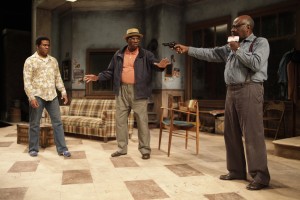 The fact that a gun appears in the first act promises that, in true Chekhovian style, it will go off in the second act. The fact that it doesn’t may be a purposeful rebuke to Chekhov; what contemporary playwright doesn’t owe something to Chekhov and, at the same time, want to run away from his influence? Bad playwriting? Or brave new playwriting? I choose the second possibility. It is very much in Wilson’s favor that he eschews the predictable. These are real people in real situations, acting very much like real people, which gives them their humanness: they are capable of seeming foolish, funny, ruminative, aggressive, contradictory, right, wrong, impulsive, sometimes afraid to stir but always alert. These are people you learn to love, because, in a sense, they are you. Perhaps, to Wilson, that was Chekhovian enough.
The fact that a gun appears in the first act promises that, in true Chekhovian style, it will go off in the second act. The fact that it doesn’t may be a purposeful rebuke to Chekhov; what contemporary playwright doesn’t owe something to Chekhov and, at the same time, want to run away from his influence? Bad playwriting? Or brave new playwriting? I choose the second possibility. It is very much in Wilson’s favor that he eschews the predictable. These are real people in real situations, acting very much like real people, which gives them their humanness: they are capable of seeming foolish, funny, ruminative, aggressive, contradictory, right, wrong, impulsive, sometimes afraid to stir but always alert. These are people you learn to love, because, in a sense, they are you. Perhaps, to Wilson, that was Chekhovian enough.
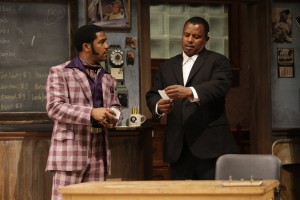 They are also great storytellers and that simple fact gives Wilson his great authority as a playwright: he, thanks to them, becomes a great storyteller himself, and it is in his stories that gritty metaphors become things of beauty, which, in turn, define the characters of those who tell the stories. And, in the theater, the task of an actor telling a story is to tell us as much about himself in the process as it is in making the story vivid. From where, inside the character’s very essence, does the story come from?
They are also great storytellers and that simple fact gives Wilson his great authority as a playwright: he, thanks to them, becomes a great storyteller himself, and it is in his stories that gritty metaphors become things of beauty, which, in turn, define the characters of those who tell the stories. And, in the theater, the task of an actor telling a story is to tell us as much about himself in the process as it is in making the story vivid. From where, inside the character’s very essence, does the story come from?
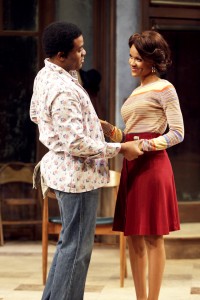 This, unfortunately, is the unanswered question of the South Coast Repertory production, which has been transferred to the Pasadena Playhouse as its last play of the current season. It is not through their stories that we learn about these men. And, while Ron OJ Parson’s direction has a nice, almost heroically lazy pace that suggests the feeling that these men know each other very well, he never seems to get under their skin as individuals. The sense of reality never metamorphoses into unblinking truth. The actors seem to come from their dressing rooms to the stage, rather than inhabit the world of Wilson’s Hill District. The world outside the cab company seems more like empty space than the streets and alleys of Pittsburgh. Although they are engaged in matters of deep seriousness, they often seem to be actors in a situation comedy. And, though they are centered, and persuasive in ways that centered people usually seem to be, they exude power but little depth, and, because they have a tendency to swallow words rather than take pleasure in their own eloquence, they deprive the play of much of its poetry. And the human conflicts, especially the central one of Becker, who runs the cab company, and his son, who has just been released from prison, is muddied and, in the penultimate scene, when it should be desperately moving, rings hollow. Pain cannot be faked. Grief is the one thing we all know. And we know when it doesn’t seem to come from the heart.
This, unfortunately, is the unanswered question of the South Coast Repertory production, which has been transferred to the Pasadena Playhouse as its last play of the current season. It is not through their stories that we learn about these men. And, while Ron OJ Parson’s direction has a nice, almost heroically lazy pace that suggests the feeling that these men know each other very well, he never seems to get under their skin as individuals. The sense of reality never metamorphoses into unblinking truth. The actors seem to come from their dressing rooms to the stage, rather than inhabit the world of Wilson’s Hill District. The world outside the cab company seems more like empty space than the streets and alleys of Pittsburgh. Although they are engaged in matters of deep seriousness, they often seem to be actors in a situation comedy. And, though they are centered, and persuasive in ways that centered people usually seem to be, they exude power but little depth, and, because they have a tendency to swallow words rather than take pleasure in their own eloquence, they deprive the play of much of its poetry. And the human conflicts, especially the central one of Becker, who runs the cab company, and his son, who has just been released from prison, is muddied and, in the penultimate scene, when it should be desperately moving, rings hollow. Pain cannot be faked. Grief is the one thing we all know. And we know when it doesn’t seem to come from the heart.
As a play, August Wilson’s Jitney has genuine sizzle, maybe even greatness within its reach. It would be wonderful to see its greatness revealed. Here, admittedly, it gets somewhat better as it moves towards its hopeful but touching conclusion, but, in stubbornly resisting its potential, it is, alas, a fizzle
photos by Henry DiRocco
Jitney
A South Coast Repertory Production at Pasadena Playhouse (Los Angeles Theater)
scheduled to end on July 15, 2012
for tickets, call 626.921.1161 or visit http://www.PasadenaPlayhouse.com
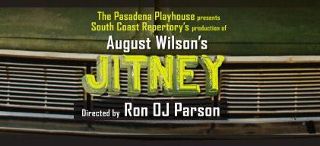

{ 3 comments… read them below or add one }
I must say that the music selections in this production of JITNEY are wonderful.
Thanks, Brian – I’m glad you enjoyed them!
Mr. Perr, you obviously were not watching the same play as me.